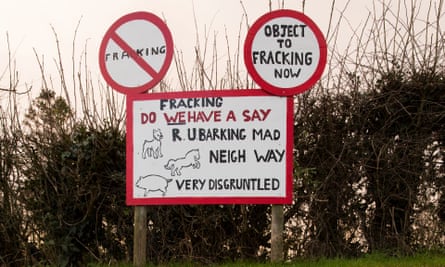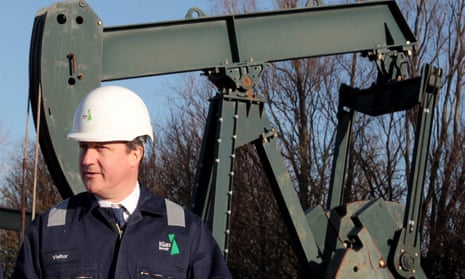Fracking for shale gas in the UK should be pursued as an alternative to the use of coal, a taskforce on the controversial technology has concluded, in order to provide a bridge to a low-carbon future.
But shale gas should not receive public subsidy or tax breaks, and the tax revenues arising from its exploitation should be redeployed to develop renewable energy and other low-carbon innovations, according to the chairman of the taskforce, former Labour cabinet minister Lord Smith.
“I can’t see any reason why the shale industry needs tax breaks,” he said. “If the gas is there and is recoverable – and that’s still a big ‘if’ – the industry can derive revenue from extracting it.
“Shale gas is not the answer to climate change. That is a mixture of renewables, nuclear and energy efficiency and other low-carbon sources of energy. But we can’t simply wave a magic wand and say that will happen tomorrow. Shale gas provides a bridge.”
The Task Force on Shale Gas, which is funded by the UK’s shale gas industry but operates independently, found that climate change targets could still be met even with an increase in the use of gas, which is less carbon-intensive than coal. When technologies known as “green completion” are used, which means stopping the leaks of methane from shale wells, the fuel is no more carbon-intensive than conventional gas, and less so than imports of liquefied natural gas from countries such as Qatar, according to the report.
But the report also found that if gas is to be used for another four decades, as envisaged by the group, then much more effort must be put into carbon capture and storage technologies. These have been problematic, as repeated attempts to set up UK pilot projects over the past decade have yet to produce a result. “The government must get a move on,” said Lord Smith. “I don’t think the reason for the slowness lies in problems with the technology. It is a lack of political will.”
Green campaigners warned, however, that if the UK were to pursue fracking, it would lead to an increase in net fossil fuel use. Tony Bosworth, energy campaigner at Friends of the Earth, said: “Three-quarters of known fossil fuel reserves need to stay in the ground if we are to avoid catastrophic climate change. Fracking in the UK would just add to this unburnable carbon, while also bringing risks for the environment and health of local communities. The taskforce doesn’t say if or how we will get others to produce less gas if we start fracking.”
Chris Redston of Frack Free Ryedale, one of many local protest groups, said: “We are not surprised the taskforce recommends a future that depends on gas production from fracking, given that this consultation is being funded by the shale gas industry. It would be impossible for anyone to conclude that this report is in any way independent or impartial.”
The report also casts doubt on the ability of renewable sources of energy to be increased sufficiently to avoid an increasing dependence on importing gas into the UK.

Lord Smith told the Guardian he was saddened by the government’s recent decisions to reduce support for renewable energy, but that shale gas could thrive alongside renewables if tax revenues from the new energy source were redeployed towards renewables and other low-carbon energy.
While wind energy alone now makes up about a fifth of electricity generation, the share of renewables in the UK’s total energy use – including energy for heating – was only about 7% in 2014. As a result, gas is likely to be relied upon for heating for 30 to 40 years to come, according to the report, and is likely to remain a major source of electricity generation.
The Conservative government has also increased the uncertainty surrounding the future of renewable energy in the UK, with an early end to onshore wind farm support and cuts to subsidies for solar and other renewables. However, the government has signalled strong support for shale gas drilling, with tax breaks aimed at kickstarting the shale industry, removal of some planning regulations and support for “sweeteners” to communities that accept shale gas wells.
Shale gas drilling involves the blasting of dense rocks with a pressurised mixture of water, sand and chemicals in order to open up tiny fissures that release microscopic bubbles of trapped natural gas. Technological advances in the past decade or so have enabled the exploitation of shale gas and oil resources in the US on a massive scale, resulting in a dramatic fall in the gas price there, but as yet this has not been replicated elsewhere.
Wednesday’s report from the taskforce is the third in a series of four. The first two dealt with the potential environmental impacts of the technology, such as the effects on water supplies. Those reports concluded that the impacts would not be damaging if carefully controlled, and recommended that government regulation and oversight should be strengthened, in particular by the setting up of a new regulator dedicated to shale in place of the current regulatory system in which responsibilities are divided among government agencies and local authorities.
The final report will be an examination of the economics of shale gas extraction in the UK.
Ken Cronin, chief executive of UK Onshore Oil and Gas, which represents the fracking industry, said: “The benefits of using domestic shale gas warrant UK-wide policies that will encourage and help markets prioritise the use of indigenous resources and technology in the pursuit of carbon reduction. This will also add to the UK’s energy resilience.”
Lord Smith also said he was against drilling for shale oil in the UK, as it would have far greater adverse environmental impacts. Geographical surveys of the UK have found regions in the north rich in shale gas, but in the south-east of England the shale resources appear to be made up mainly of oil, which is harder to extract.
